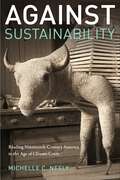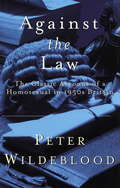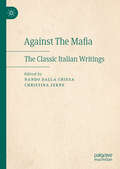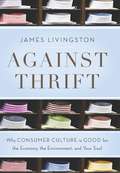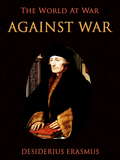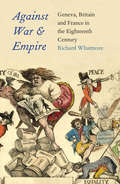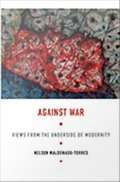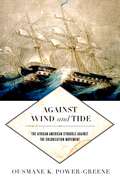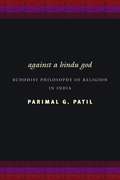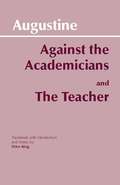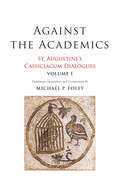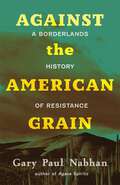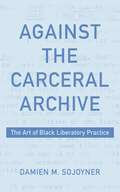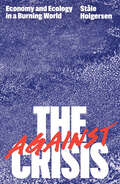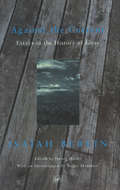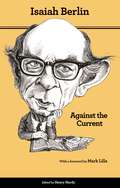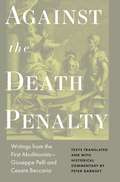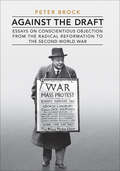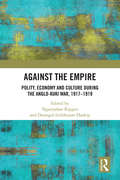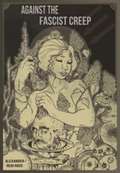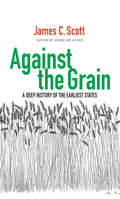- Table View
- List View
Against Sustainability: Reading Nineteenth-Century America in the Age of Climate Crisis
by Michelle NeelyAgainst Sustainability responds to the twenty-first-century environmental crisis by unearthing the nineteenth-century U.S. literary, cultural, and scientific contexts that gave rise to sustainability, recycling, and preservation. Through novel pairings of antebellum and contemporary writers including Walt Whitman and Lucille Clifton, George Catlin and Louise Erdrich, and Herman Melville and A. S. Byatt, the book demonstrates that some of our most vaunted strategies to address ecological crisis in fact perpetuate environmental degradation.Yet Michelle C. Neely also reveals that the nineteenth century offers useful and generative environmentalisms, if only we know where and how to find them. Henry David Thoreau and Emily Dickinson experimented with models of joyful, anti-consumerist frugality. Hannah Crafts and Harriet Wilson devised forms of radical pet-keeping that model more just ways of living with others. Ultimately, the book explores forms of utopianism that might more reliably guide mainstream environmental culture toward transformative forms of ecological and social justice. Through new readings of familiar texts, Against Sustainability demonstrates how nineteenth-century U.S. literature can help us rethink our environmental paradigms in order to imagine more just and environmentally sound futures.
Against The Law
by Peter Wildeblood'This right which I claim for myself and for all those like me is the right to choose the person whom I love' Peter WildebloodIn March 1954 Peter Wildeblood, a London journalist, was one of five men charged with homosexual acts in the notorious Montagu case. Wildeblood was sentenced to eighteen months in prison, along with Lord Montagu and Major Michael Pitt-Rivers. The other two men were set free after turning Queen's Evidence.Against the Law tells the story of Wildeblood's childhood and schooldays, his war service, his career as a journalist, his arrest, trial and imprisonment, and finally his return to freedom. In its honesty and restraint it is eloquent testimony to the inhumanity of the treatment of gay men in Britain within living memory.
Against The Law
by Peter Wildeblood'This right which I claim for myself and for all those like me is the right to choose the person whom I love' Peter WildebloodIn March 1954 Peter Wildeblood, a London journalist, was one of five men charged with homosexual acts in the notorious Montagu case. Wildeblood was sentenced to eighteen months in prison, along with Lord Montagu and Major Michael Pitt-Rivers. The other two men were set free after turning Queen's Evidence.Against the Law tells the story of Wildeblood's childhood and schooldays, his war service, his career as a journalist, his arrest, trial and imprisonment, and finally his return to freedom. In its honesty and restraint it is eloquent testimony to the inhumanity of the treatment of gay men in Britain within living memory.
Against The Mafia: The Classic Italian Writings
by Nando Dalla Chiesa Christina JerneThis collection of classic texts offers a longitudinal overview of the Italian mafia through the eyes of those who have questioned it in the past 144 years. It presents English translations of the key works of, among others, judges (Giovanni Falcone), political theorists (Gaetano Mosca), trade unionists (Pio La Torre), journalists (Giuseppe Fava), generals (Carlo Alberto Dalla Chiesa), and priests (Don Diana). These critical voices have been foundational to shaping the way Italian culture, policies and legislation relate to the mafia phenomenon. They represent different political standpoints, from elitism to communism, as well as vastly different times, from post-feudalism to hyper globalization. This book offers a rare (and hitherto untranslated) insight into, not only the history of the Italian mafia and its conceptualizations, but also into the movement against the mafia, which is one of the longest lasting (and most unrecognized) European social movements. It provides a usefulhistorical archive of Italian political and sociological thought and a diversity of perspectives through which to tackle a complex and increasingly global criminological issue, making it relevant for those interested in Italian studies, political theory, sociology, criminology, legal studies, and history.
Against Thrift
by James LivingstonSince the financial meltdown of 2008, economists, journalists, and politicians have uniformly insisted that to restore the American Dream and renew economic growth, we need to save more and spend less. In his provocative new book, historian James Livingston--author of the classic Origins of the Federal Reserve System--breaks from the consensus to argue that underconsumption caused the current crisis and will prolong it. By viewing the Great Recession through the prism of the Great Depression, Livingston proves that private investment is not the engine of growth we assume it to be. Tax cuts for business are therefore a recipe for disaster. If our goal is to reproduce the economic growth of the postwar era, we need a redistribution of income that reduces corporate profits, raises wages, and promotes consumer spending.
Against War (The World At War)
by Desiderius ErasmusA classic anti-war essay from the mid-1500s. Erasmus gives elegant arguments against war from both religious (Christian) and logical (economic, practical) points of view. He seems particularly alarmed and confused by Christians fighting wars with Christians. The problem, of course, is that people waging war only consider religious or logical reasons when they are looking for excuses to wage war.
Against War and Empire
by Richard WhatmoreAs Britain and France became more powerful during the eighteenth century, small states such as Geneva could no longer stand militarily against these commercial monarchies. Furthermore, many Genevans felt that they were being drawn into a corrupt commercial world dominated by amoral aristocrats dedicated to the unprincipled pursuit of wealth. In this book Richard Whatmore presents an intellectual history of republicans who strove to ensure Geneva’s survival as an independent state. Whatmore shows how the Genevan republicans grappled with the ideas of Rousseau, Voltaire, Bentham, and others in seeking to make modern Europe safe for small states, by vanquishing the threats presented by war and by empire.
Against War with Iraq: An Anti-war Primer (Open Media Series)
by Barbara Olshansky Michael Ratner Jennie GreenDespite public outcry at home and international opposition abroad, the Bush Administration deployed troops and invested millions in preparation for a massive military assault on Iraq. In this Open Media Series special edition, three legal scholars from the Center for Constitutional Rights argue persuasively that the looming war against Iraq is both unnecessary for national security, and illegal. Against War with Iraq describes the high cost of the US war in Iraq in terms of human life, as well as the economic and political havoc it will trigger. A timely and much needed anti-war primer, Against War with Iraq contains the core facts and analysis needed to understand the issues and become an effective advocate against hawkish U.S. foreign policy.
Against War: Views from the Underside of Modernity
by Nelson Maldonado-TorresNelson Maldonado-Torres argues that European modernity has become inextricable from the experience of the warrior and conqueror. In Against War, he develops a powerful critique of modernity, and he offers a critical response combining ethics, political theory, and ideas rooted in Christian and Jewish thought. Maldonado-Torres focuses on the perspectives of those who inhabit the underside of western modernity, particularly Jewish, black, and Latin American theorists. He analyzes the works of the Jewish Lithuanian-French philosopher and religious thinker Emmanuel Levinas, the Martiniquean psychiatrist and political thinker Frantz Fanon, and the Catholic Argentinean-Mexican philosopher, historian, and theologian Enrique Dussel. Considering Levinas's critique of French liberalism and Nazi racial politics, and the links between them, Maldonado-Torres identifies a "master morality" of dominion and control at the heart of western modernity. This master morality constitutes the center of a warring paradigm that inspires and legitimizes racial policies, imperial projects, and wars of invasion. Maldonado-Torres refines the description of modernity's war paradigm and the Levinasian critique through Fanon's phenomenology of the colonized and racial self and the politics of decolonization, which he reinterprets in light of the Levinasian conception of ethics. Drawing on Dussel's genealogy of the modern imperial and warring self, Maldonado-Torres theorizes race as the naturalization of war's death ethic. He offers decolonial ethics and politics as an antidote to modernity's master morality and the paradigm of war. Against War advances the de-colonial turn, showing how theory and ethics cannot be conceived without politics, and how they all need to be oriented by the imperative of decolonization in the modern/colonial and postmodern world.
Against Wind and Tide: The African American Struggle against the Colonization Movement (Early American Places #10)
by Ousmane K. Power-GreeneAgainst Wind and Tide tells the story of African American’s battle against the American Colonization Society (ACS), founded in 1816 with the intention to return free blacks to its colony Liberia. Although ACS members considered free black colonization in Africa a benevolent enterprise, most black leaders rejected the ACS, fearing that the organization sought forced removal. As Ousmane K. Power-Greene’s story shows, these African American anticolonizationists did not believe Liberia would ever be a true “black American homeland.”In this study of anticolonization agitation, Power-Greene draws on newspapers, meeting minutes, and letters to explore the concerted effort on the part of nineteenth century black activists, community leaders, and spokespersons to challenge the American Colonization Society’s attempt to make colonization of free blacks federal policy. The ACS insisted the plan embodied empowerment. The United States, they argued, would never accept free blacks as citizens, and the only solution to the status of free blacks was to create an autonomous nation that would fundamentally reject racism at its core. But the activists and reformers on the opposite side believed that the colonization movement was itself deeply racist and in fact one of the greatest obstacles for African Americans to gain citizenship in the United States.Power-Greene synthesizes debates about colonization and emigration, situating this complex and enduring issue into an ever broader conversation about nation building and identity formation in the Atlantic world.
Against a Brightening Sky (Delia Martin #3)
by Jaime Lee MoyerBy 1919 the Great War has ended, peace talks are under way in Paris, and the world has been forever changed. Delia Martin, apprentice practitioner of magical arts, and her husband, Police Captain Gabriel Ryan, face the greatest challenge of their lives when fragments from the war descend on San Francisco. As Delia prepares to meet friends at a St. Patrick's Day parade, the strange ghost of a European princess appears in her mirror. Her pleasant outing becomes a nightmare as the ghost reappears moments after a riot starts, warning her as a rooftop gunman begins shooting into the crowd. Delia rushes to get her friends to safety, and Gabe struggles to stop the killing-and to save himself. Delia and Gabe realize all the chaos and bloodshed had one purpose-to flush Alina from hiding, a young woman with no memory of anything but her name. As Delia works to discover how the princess ghost's secrets connect to this mysterious young woman, and Gabe tracks a ruthless killer around his city, they find all the answers hinge on two questions: Who is Alina...and why can't she remember?Against a Brightening Sky is the thrilling conclusion to Jaime Lee Moyer's glittering historical fantasy series.
Against a Hindu God: Buddhist Philosophy of Religion in India
by Parimal PatilPhilosophical arguments for and against the existence of God have been crucial to Euro-American and South Asian philosophers for over a millennium. Critical to the history of philosophy in India, were the centuries-long arguments between Buddhist and Hindu philosophers about the existence of a God-like being called Isvara and the religious epistemology used to support them. By focusing on the work of Ratnakirti, one of the last great Buddhist philosophers of India, and his arguments against his Hindu opponents, Parimal G. Patil illuminates South Asian intellectual practices and the nature of philosophy during the final phase of Buddhism in India. <P><P>Based at the famous university of Vikramasila, Ratnakirti brought the full range of Buddhist philosophical resources to bear on his critique of his Hindu opponents' cosmological/design argument. At stake in his critique was nothing less than the nature of inferential reasoning, the metaphysics of epistemology, and the relevance of philosophy to the practice of religion. In developing a proper comparative approach to the philosophy of religion, Patil transcends the disciplinary boundaries of religious studies, philosophy, and South Asian studies and applies the remarkable work of philosophers like Ratnakirti to contemporary issues in philosophy and religion.
Against the Academicians and The Teacher
by Peter King AugustineThese new translations of two treatises dealing with the possibility and nature of knowledge in the face of skeptical challenges are the first to be rendered from the Latin critical edition, the first to be made specifically with a philosophical audience in mind, and the first to be translated by a scholar with expertise in both modern epistemology and philosophy of language.
Against the Academics: St. Augustine's Cassiciacum Dialogues, Volume 1
by Saint AugustineA fresh, new translation of Augustine’s inaugural work as a Christian convert The first four works written by St. Augustine of Hippo after his conversion to Christianity are the remarkable “Cassiciacum dialogues.” In this first dialogue, expertly translated by Michael Foley, Augustine and his interlocutors explore the history and teachings of Academic skepticism, which Augustine is both sympathetic to and critical of. The dialogue serves as a fitting launching point for a knowledge of God and the soul, the overall subject of the Cassiciacum tetralogy.
Against the American Grain: A Borderlands History of Resistance
by Gary Paul NabhanA century ago, William Carlos Williams’s In the American Grain profiled Anglo, French, and Spanish conquistadors, tyrants, preachers, and thought leaders who first shaped American culture. Since then, waves of resistance and disruptive innovation have flooded into the rest of America from the arid, southwestern margins of the US-Mexico borderlands.Now, in Against the American Grain, Gary Paul Nabhan—cultural ecologist, environmental historian, and lyric poet of the American Southwest—illuminates the outlines of a history too long in the shadows. Whether Indigenous, LatinX, priests, nuns, Quakers, or cross-cultural chameleons, it is the resisters, performers, grassroots organizers, nomads, and spiritual leaders from the desert margins who are constantly reshaping America. They have, against all odds, recolored and recovered the future of North America through outrageous acts of resistance.After reading the stories of Estevanico el Moro, Maria de Ágreda, Teresita de Cábora, Coyote Iguana, Woody Guthrie, Tim X. Hernandez, Cesar Chavez, Dolores Huerta, Reyes Lopez Tijerana, Arturo Sandoval, Lalo Guererro, John Fife, Danny and Luis Valdez, John Steinbeck and Ed Ricketts, and many more, we can never think about America the same way again. In Nabhan’s magisterial, radical recounting, cross-cultural collaborations have changed the grain of American life to one that is many-colored, once again flourishing with fragrance, faith, and fecund ideas.
Against the Carceral Archive: The Art of Black Liberatory Practice
by Damien SojoynerAgainst the Carceral Archive is a meditation upon what author Damien M. Sojoyner calls the “carceral archival project,” offering a distillation of critical, theoretical, and activist work of prison abolitionists over the past three decades. Working from collections at the Southern California Library (Black Panthers, LA Chapter; the Coalition Against Police Abuse; Urban Policy Research Institute; Mothers Reclaiming Our Children; and the collection of geographer Clyde Woods), it builds upon theories of the archive to examine carcerality as the dominant mode of state governance over Black populations in the United States since the 1960s.Each chapter takes up an element of the carceral archive and its destabilization, destruction, and containment of Black life: its notion of the human and the production of “pejorative blackness,” the intimate connection between police and military in the protection of racial capitalism and its fossil fuel–based economy, the role of technology in counterintelligence, and counterinsurgency logics. Importantly, each chapter also emphasizes the carceral archive’s fundamental failure to destroy “Black communal logics” and radical Black forms of knowledge production, both of which contest the carceral archive and create other forms of life in its midst. Concluding with a statement on the reckoning with the radical traditions of thought and being which liberation requires, Sojoyner offers a compelling argument for how the centering of Blackness enables a structuring of the mind that refuses the violent exploitative tendencies of Western epistemological traditions as viable life-affirming practices.
Against the Consensus
by Justin Yifu LinIn June 2008, Justin Yifu Lin was appointed Chief Economist of the World Bank, right before the eruption of the worst global financial and economic crisis since the Great Depression. Drawing on experience from his privileged position, Lin offers unique reflections on the cause of the crisis, why it was so serious and widespread, and its likely evolution. Arguing that conventional theories provide inadequate solutions, he proposes new initiatives for achieving global stability and avoiding the recurrence of similar crises in the future. He suggests that the crisis and the global imbalances both originated with the excess liquidity created by US financial deregulation and loose monetary policy, and recommends the creation of a global Marshall Plan and a new supranational global reserve currency. This thought-provoking book will appeal to academics, graduate students, policy makers, and anyone interested in the global economy.
Against the Crisis: Economy and Ecology in a Burning World
by Ståle HolgersenCapitalism produces crises and crises reproduce capitalism. We need an ecosocialist way outIf crisis defines our era, we need a coherent socialist policy in response. Ståle Holgersen delves into today&’s economic and ecological crises to demonstrate that they are not exceptions to an otherwise functioning system but integral to its operation. It is naive to see these upheavals as opportunities for reform or revolution. They are the bedrock of the status quo. Fortunately, the vicious circle sustaining capitalism is not founded on an iron law. Our historical mission in the face of the climate crisis is to create a historical exception to the rule. It is time for ecosocialism against crisis.
Against the Current: Essays in the History of Ideas
by Isaiah BerlinBerlin's main theme in these essays is the importance in the history of ideas of dissenters whose thinking still challenges conventional wisdom - among them Machiavelli, Vico, Montesquieu, Herzen and Sorel. With his unusual powers of imaginative re-creation, he brings to life original minds that swam against the current of their times, and in the process offers a powerful defence of variety in our visions of life. Roger Hausheer's introduction surveys Berlin's whole oeuvre, and the full bibliography of his pubication has been updated for this Pimlico edition.
Against the Current: Essays in the History of Ideas - Second Edition
by Isaiah BerlinIn this outstanding collection of essays, Isaiah Berlin, one of the great thinkers of the twentieth century, discusses the importance of dissenters in the history of ideas--among them Machiavelli, Vico, Montesquieu, Herzen, and Sorel. With his unusual powers of imaginative re-creation, Berlin brings to life original minds that swam against the current of their times--and still challenge conventional wisdom. In a new foreword to this corrected edition, which also includes a new appendix of letters in which Berlin discusses and further illuminates some of its topics, noted essayist Mark Lilla argues that Berlin's decision to give up a philosophy fellowship and become a historian of ideas represented not an abandonment of philosophy but a decision to do philosophy by other, perhaps better, means. "His instinct told him," Lilla writes, "that you learn more about an idea as an idea when you know something about its genesis and understand why certain people found it compelling and were spurred to action by it." This collection of fascinating intellectual portraits is a rich demonstration of that belief.
Against the Death Penalty: Writings from the First Abolitionists—Giuseppe Pelli and Cesare Beccaria
by Cesare Beccaria Giuseppie PelliThe first known abolitionist critique of the death penalty—here for the first time in EnglishIn 1764, a Milanese aristocrat named Cesare Beccaria created a sensation when he published On Crimes and Punishments. At its centre is a rejection of the death penalty as excessive, unnecessary, and pointless. Beccaria is deservedly regarded as the founding father of modern criminal-law reform, yet he was not the first to argue for the abolition of the death penalty. Against the Death Penalty presents the first English translation of the Florentine aristocrat Giuseppe Pelli's critique of capital punishment, written three years before Beccaria's treatise, but lost for more than two centuries in the Pelli family archives.Peter Garnsey examines the contrasting arguments of the two abolitionists, who drew from different intellectual traditions. Pelli was a devout Catholic influenced by the writings of natural jurists such as Hugo Grotius, whereas Beccaria was inspired by the French Enlightenment philosophers. While Beccaria attacked the criminal justice system as a whole, Pelli focused on the death penalty, composing a critique of considerable depth and sophistication. Garnsey explores how Beccaria's alternative penalty of forced labour, and its conceptualisation as servitude, were embraced in Britain and America, and delves into Pelli's voluminous diaries, shedding light on Pelli's intellectual development and painting a vivid portrait of an Enlightenment man of letters and of conscience.With translations of letters exchanged by the two abolitionists and selections from Beccaria's writings, Against the Death Penalty provides new insights into eighteenth-century debates about capital punishment and offers vital historical perspectives on one of the most pressing questions of our own time.
Against the Draft
by Peter BrockAround the world and for hundreds of years, men and women have refused to be drafted into bearing arms for their nations' wars. These conscientious objectors to the draft are the subject of Peter Brock's latest collection, Against the Draft. Brock, the world's leading historian on pacifism, has assembled twenty-five of his essays on conscientious objection to the draft from the beginning of the Radical Reformation in 1525 to the end of the Second World War.Included in the collection are essays on little known facets of the anti-draft movement including the Anabaptist-Mennonite tradition of military exemption that started with the outset of the Radical Reformation in 1525 and has continued, with variations, until the present. Further articles deal with the Quakers in a number of countries, Civil-war America, Leo Tolstoy (who became a convinced pacifist in the later part of his life,) British conscientious objectors in the Non-Combatant Corps, the emergence of conscientious objection in Japan, and the fate of conscientious objectors in the psychiatric clinics of Germany and in interwar Poland. Essays on the Central European Nazerenes and on Jehovah's Witnesses in Nazi Germany highlight the exceptionally harsh treatment meted out to conscientious objectors belonging to these two sects, and their steadfast resistance to the state's demand to bear arms. Against the Draft makes an important contribution to the growing study of pacifism and conscientious objection, and represents a key work in the career of the field's foremost scholar.
Against the Empire: Polity, Economy and Culture during the Anglo-Kuki War, 1917-1919
by Ngamjahao Kipgen Doungul Letkhojam HaokipThis book explores the Kuki uprising against the British Empire during the First World War in the northeast frontier of India (then the Assam–Burma frontier). It sheds light on how the three-year war (1917–1919), spanning over 6,000 square miles, is crucial to understanding present-day Northeast India. Companion to the seminal The Anglo-Kuki War, 1917–1919, the chapters in this volume: • Examine several aspects of the Anglo-Kuki War, which had far-reaching consequences for the indigenous Kuki population, including economy, politics, identity, indigenous culture and belief systems, and traditional institutions during and after the First World War itself; • Highlight finer themes such as the role of the chiefs and war councils, symbols of communication, indigenous interpretation of the war, remembrance, and other policies which continued to confront the Kuki communities; • Interrogate themes of colonial geopolitics, colonialism and the missionaries, state making, and the frontier dimensions of the First World War. Moving away from colonial ethnographies, the volume taps on a variety of sources – from civilisational discourse to indigenous readings of the war, from tour diaries to oral accounts – meshing together the primitive with the modern, the tribal and the settled. This book will be of great interest to scholars and researchers of South and Southeast Asian Studies, area studies, modern history, military and strategic studies, insurgency and counterinsurgency studies, tribal warfare, and politics.
Against the Fascist Creep
by Alexander Reid RossUS society is notoriously complacent when it comes to the rise of fascist tendencies. When Dylann Roof murdered nine black parishioners in a Charleston church, media emphasis remained superficial. Familiar narratives of insane lone wolves and Confederate flags masked the organizations that inspired Roof's act and their connections to politicians at the local, state, and federal levels throughout the South—groups like the Council of Conservative Citizens (formerly the White Citizens Council).Scratch the surface of such groups and you'll find a web of complex ties and front groups created by fascist ideologues. Trace the connections further and further back and you find yourself moving from semi-respectable organizations through darker and darker levels of fascism and hatred.Fascism is not a euphemism here. A terrifying tour of the history and influence of international neo-fascists, Against the Fascist Creep maps the connections and names the names, showing how infiltration is a conscious and secret program for white nationalist and neo-Nazi groups. Their activity has exploded since the economic crisis and they have stepped up efforts to influence both mainstream and radical groups, including anarchists.This book is a line in the sand that both identifies the creep of fascist messages, ideas, and organization throughout our society and outlines how to stop it in its tracks. Alexander Reid Ross is a contributing moderator of the Earth First! Newswire. He is the editor of Grabbing Back: Essays Against the Global Land Grab and a contributor to Life During Wartime: Resisting Counterinsurgency.
Against the Grain: A Deep History of the Earliest States
by James C. ScottAn account of all the new and surprising evidence now available for the beginnings of the earliest civilizations that contradict the standard narrative Why did humans abandon hunting and gathering for sedentary communities dependent on livestock and cereal grains, and governed by precursors of today’s states? Most people believe that plant and animal domestication allowed humans, finally, to settle down and form agricultural villages, towns, and states, which made possible civilization, law, public order, and a presumably secure way of living. But archaeological and historical evidence challenges this narrative. The first agrarian states, says James C. Scott, were born of accumulations of domestications: first fire, then plants, livestock, subjects of the state, captives, and finally women in the patriarchal family—all of which can be viewed as a way of gaining control over reproduction. Scott explores why we avoided sedentism and plow agriculture, the advantages of mobile subsistence, the unforeseeable disease epidemics arising from crowding plants, animals, and grain, and why all early states are based on millets and cereal grains and unfree labor. He also discusses the “barbarians” who long evaded state control, as a way of understanding continuing tension between states and nonsubject peoples.
